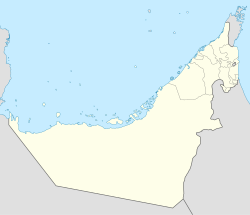This article has an unclear citation style. (January 2020) |
The Jumeirah Archaeological Site is a site which dates back to the Abbasid period in the 9th century AD, in the district of Jumeirah in the city of Dubai, the United Arab Emirates. It was first excavated in 1969 with different ancient items including architectural and decorative findings, ranging from a mosque, caravanserai, and residential houses to glazed pottery jars and plateware, bronze coins, glass and stone artefacts.[1][2][3] It is owned and managed by Dubai Culture & Arts Authority.
 Jumeirah Archaeological Site Office Building | |
| Location | Dubai, the U.A.E. |
|---|---|
| Coordinates | 25°11′48″N 55°14′30″E / 25.19679°N 55.24180°E |
| Area | Approximately 80,000 m2 (8.0 ha; 20 acres)[1] |
| Site notes | |
| Discovered | 1969[1] |
Overview
editArchaeological excavations at the site,[1][2][3] which was discovered in 1969, demonstrate that the area was inhabited as far back as the Abbasid era, approximately in the 10th century CE. At this time, it appears to have been the coastal part of an Eastern Arabian subregion referred to as 'Tawam', which comprises the city of Al Ain in the Emirate of Abu Dhabi, and the adjacent Omani town of Al-Buraimi.[4][5] Measuring about 80,000 m2 (860,000 sq ft), the site lays along a caravan route linking India and China to Oman and Iraq.[1][2][3]
Gallery
editSee also
editReferences
edit- ^ a b c d e Al Amir, Khitam; Cherian, Dona (2020-01-09). "Look: Sheikh Mohammed Bin Rashid visits Jumeirah Archaeological Site". Gulf News. Retrieved 2020-01-12.
- ^ a b c "Mohammed bin Rashid visits Jumeirah Archaeological Site". Emirates 24/7. 2020-01-09. Retrieved 2020-01-12.
- ^ a b c "'Happy and proud' Ruler of Dubai meets archaeologists at Jumeirah dig site". The National. 2020-01-09. Retrieved 2020-01-12.
- ^ Abed, Ibrahim; Hellyer, Peter (2001). "The Coming of Islam and the Islamic Period in the UAE". The United Arab Emirates, A New Perspective. London: Trident Press Ltd. pp. 73–88. ISBN 978-1-900724-47-0.
- ^ Leech, Nick (2015-10-22). "The long read: has a lost Arab capital been found on the Oman-UAE border?". The National. Retrieved 2019-01-20.
External links
edit- Jumeirah Archaeological Site, Dubai Culture & Arts Authority
- Lonelyplanet website


